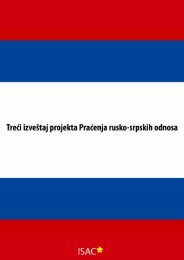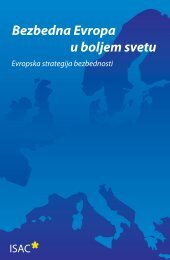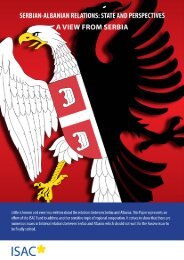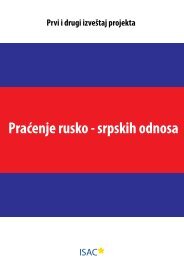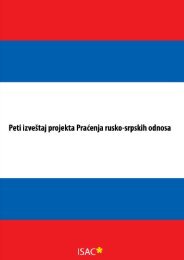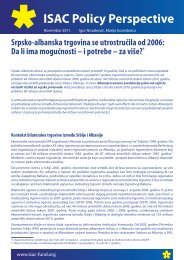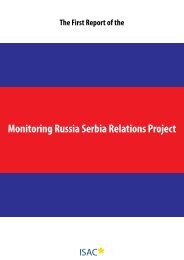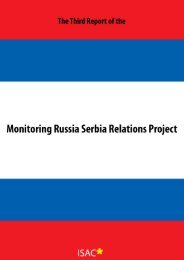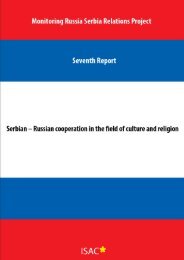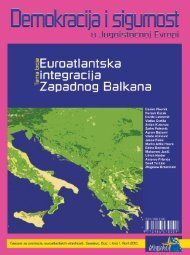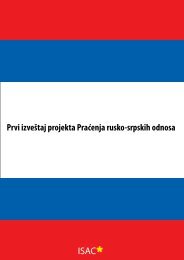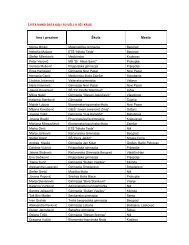the process of security sector reform - ISAC Fund
the process of security sector reform - ISAC Fund
the process of security sector reform - ISAC Fund
Create successful ePaper yourself
Turn your PDF publications into a flip-book with our unique Google optimized e-Paper software.
George Katsirdakis SECURITY SECTOR REFORM FROM A NATO VIEWPOINT<br />
George Katsirdakis SECURITY SECTOR REFORM FROM A NATO VIEWPOINT<br />
POSSIBLE ACTIVITIES TO IMPLEMENT DSSR<br />
AND MONITOR IMPLEMENTATION<br />
Turning now to practical activities in <strong>the</strong> context <strong>of</strong> <strong>the</strong> Partnership that could<br />
become <strong>the</strong> tools through which DSSR could be implemented in <strong>the</strong> broader<br />
Partnership region, one could think <strong>of</strong> a multitude <strong>of</strong> such activities. Such<br />
activities could include <strong>the</strong> following, although <strong>the</strong> list is not exhaustive:<br />
• Annual Survey <strong>of</strong> structures, missions, organization, interrelationships,<br />
capabilities, training and <strong>reform</strong> plans <strong>of</strong> elements <strong>of</strong> <strong>the</strong> defence and<br />
<strong>security</strong> <strong>sector</strong> to be provided by each PfP nation. The Survey would<br />
Include a separate chapter for each element <strong>of</strong> <strong>the</strong> <strong>sector</strong>s;<br />
• Annual Assessment and Consolidated Report on <strong>the</strong> status and <strong>reform</strong><br />
activity <strong>of</strong> <strong>the</strong> defence and <strong>security</strong> <strong>sector</strong>;<br />
• Development <strong>of</strong> special DSSR Partnership Goals for implementation <strong>of</strong><br />
DSSR by willing nations in <strong>the</strong> context <strong>of</strong> PARP/MAP;<br />
• Ad Hoc inter-service meetings (e.g. armed forces with o<strong>the</strong>r uniformed<br />
agencies) to share experiences on <strong>reform</strong> activities and to discuss<br />
coordination and cooperation in dealing with current <strong>security</strong> threats;<br />
• PfP Exercises on inter-service cooperation and coordination Involving<br />
various defence and <strong>security</strong> <strong>sector</strong> actors;<br />
• Programmes for career development for civilian experts for <strong>the</strong> defence<br />
and <strong>security</strong> <strong>sector</strong>s;<br />
• Assistance programmes for Partner countries to help train personnel and,<br />
organise and finance DSSR activities by Partner countries;<br />
• Provision <strong>of</strong> civilian and military advisers to Partner governments to<br />
advise about DDSR;<br />
• Establishment <strong>of</strong> expert advisory teams including national experts on<br />
DSSR to advise governments on DSSR;<br />
• Opening <strong>of</strong> special courses at NATO Defence College, NATO School<br />
Oberammergau, PfP Training Centres and national educational establishments<br />
on DSSR Issues;<br />
• Organise roundtables on DSSR with parliamentarians, members <strong>of</strong> defence<br />
and <strong>security</strong> <strong>sector</strong> services and members <strong>of</strong> civil society bodies<br />
to discuss DSSR and exchange views;<br />
• Develop a DSSR web site as an on-line data base and reference library<br />
on DSSR issues to share information, have access to publications, legislation,<br />
general knowledge and technical assistance;<br />
• Develop EAPC/PfP staff talks, conferences, seminars and workshops to<br />
focus on individual components <strong>of</strong> <strong>the</strong> defence and <strong>security</strong> <strong>sector</strong> and<br />
on <strong>reform</strong> issues;<br />
• Encourage research on defence and SSR requirements and implementation<br />
in <strong>the</strong> form <strong>of</strong> NATO-sponsored fellowships with particular focus on<br />
inter-agency coordination and cooperation.<br />
CONCLUSIONS<br />
As already described in <strong>the</strong> preceding paragraphs, <strong>the</strong> issue <strong>of</strong> SSR is a fairly<br />
recent invention as a term and as a systemic approach to defence and <strong>security</strong><br />
issues. However, <strong>the</strong> underlying elements have long been issues <strong>of</strong> concern and<br />
various nations and international organisations have been focussing on <strong>the</strong>m.<br />
NATO, already heavily involved in defence <strong>reform</strong> issues, has recently been<br />
considering its involvement in <strong>the</strong> broader area <strong>of</strong> SSR realising that o<strong>the</strong>r international<br />
organisations have also been working in this field. Efforts have already<br />
been made to better coordinate and cooperate with <strong>the</strong> EU, <strong>the</strong> OSCE, and <strong>the</strong><br />
Stability Pact and <strong>the</strong> first positive result has been <strong>the</strong> Ohrid Conference on<br />
Border Security in <strong>the</strong> Balkans.<br />
NATO has also been considering <strong>the</strong> possibility <strong>of</strong> introducing a Partnership<br />
Action Plan on Defence and Security Sector Reform but that PAP-DSSR has<br />
not yet materialised. As <strong>the</strong>se efforts mature it is conceivable that NATO and <strong>the</strong><br />
Partnership will also be directly involved in <strong>the</strong> DSSR in <strong>the</strong> near future.<br />
This paper was originally published in <strong>the</strong> Compendium <strong>of</strong> lectures from<br />
The Second School <strong>of</strong> Security Sector Reform, in 2003.<br />
64 65



